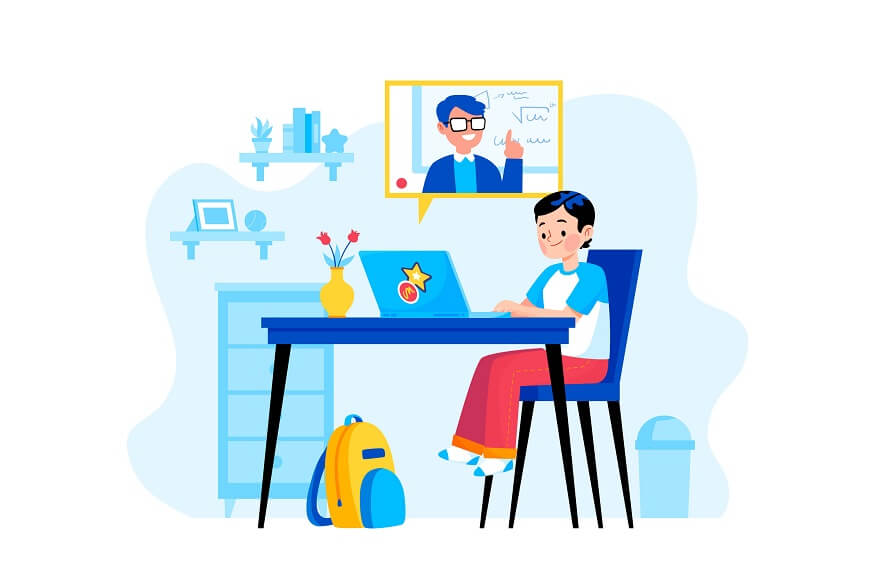A digital force is changing the world around us at a pace. Digital technologies have changed the way we live, work, and socialise. The learning and education system has seen one of the most significant transformations via digital over the last few years. The COVID pandemic was responsible for accelerating this transformation of digital learning. The entire classroom system had to be moved online given the long-drawn lockdown scenario. While the Ed-tech sector was seeing strong growth, the COVID lockdowns exponentially accelerated the adoption of digital channels of learning for learners of all ages. COVID has largely receded however the digital transformation of learning has stayed on. We are back to physical classroom-based learning, but digital interventions and hybrid learning models have made a permanent space for themselves in our education system. This makes it imperative for parents, schools, and teachers to introduce digital learning to children right from their early days.
The influences of digital technologies, especially for children haven’t all been positive. Digital technologies have their drawbacks and challenges that lead to undesirable effects on children. Hence, the age at which we should introduce small children to digital learning is a critical question to ponder upon. This blog offers certain tips for parents, teachers, and schools to make an informed decision on when and how to introduce digital learning to small children.
Also Read: What is Blended Learning? | Types, Examples
When to introduce digital learning to children?
Most reputed schools have begun to adopt digital learning right from the primary schooling stage. Hence, parents should keep track of school progression towards digital learning and introduce children to digital learning tools just before digital learning begins at school. This will ensure that children are well prepared to make the best out of their digital learning environment at school and are not taken by surprise. In today’s hyper-digital world, it has become commonplace for even toddlers to be using smartphones and tablets in their daily routines. Many parents introduce digital learning platforms such as YouTube right at the preschool stage.
Also Read: Advantages and Disadvantages of Online Learning
Factors to be cautious of while introducing digital learning to small children.
Beware of the distractions
Digital learning on internet-connected devices such as laptops, tablets or smartphones also leaves small children susceptible to other enticing distractions of the web and social media. In the initial days, guardians must take measures to keep the focus on learning and keep these digital distractions away while the child is learning through digital means. Child lock mechanisms, internet firewalls, and various other mechanisms can be deployed to block unwanted stuff from being accessed by small children. It is also advised that children be introduced gradually under the supervision of parents, guardians, or teachers. These guardians can play the dual role of one, hand holding the small children so that they get used to operating the digital technologies and two, warding off any unwanted influences or content that might just ‘pop up’ while the child is learning digitally.
Small children are easily influenced by what they see in the digital world. They have curious minds and like exploring things new to them. This makes them susceptible to being lured into such unwanted distractions. Guardians must take all measures and provide active supervision to ward off these unwanted influences.
Screen time
The global average screen times are hovering at seven hours per day. Such a long duration of exposure to screens leads small children susceptible to a lot of physical and mental problems. Extended screen time usually numbs the brain and is usually sedentary in nature. This could lead to a phenomenon popularly known as digital fatigue. Guardians must ensure regular breaks and off-screen times are interspersed between extended screen-oriented digital learning sessions. Children must keep proper posture while attending online classes. The lighting of the study area must be optimal to avoid strain on the eyes. Regular breaks must be taken wherein the child must get off the screen and ideally engage in some kind of energising physical activity. Moving between online classes, to television, to video games, etc can have long-lasting adverse effects on the mental and physical health of the child. Such effects can make worrying propositions, especially for small children.
If children are engaged in extended digital learning sessions, guardians must block time for off-screen activities post classes to physically and mentally engage the children in a non-digital world. This can greatly avoid the onset of digital fatigue in small children.
Online Safety
We might be consuming digital content from the safe confines of our homes or schools; however, it would be a mistake to take online safety for granted. Small children are susceptible to disturbing content, online bullying, mental harassment and many such unwanted impressions if they are left unsupervised online. Sufficient online security measures must be deployed on the devices used by small children for their learning purpose.
Out of peer pressure or any other entertainment-led pleasures, children might be drawn towards the charms of social media. This might open them up to online bullying, or harassment which might leave an indelible scar on their psyche. Parents must make sure that children are exposed to such media only when they have developed the required maturity to handle these unknown influences that might come their way once they are exposed to the hyperconnected and open world of social media.
Also Read: Ways Parents Can Support Their Children’s Online Learning
Compliment with physical learning
Parents and teachers must strive to strike an optimal balance between online and physical learning. For example, reading books and writing have unfathomable virtues which are somehow getting lost in the keyboard-led digital world. Parents and teachers must ensure that small children spend ample amounts of time reading books, writing, doing practical science experiments, gathering learning from real-life experiences, socialising with friends and classmates, engaging in sports and extracurricular activities, etc. Any imbalance here can hamper the holistic learning and personality development of children.
At EuroSchool, we boast of leveraging best-in-class digital technologies to enhance the learning experiences of our students. At the same time, we ensure the right balance between online and offline learning with a healthy mix of offline classes, practical classes, lab experiments, experiential learning, sports, and extracurricular activities. This optimal mix ensures that our students develop a holistic view of the world while being extremely tech-savvy and leveraging all the benefits of digital learning simultaneously.









